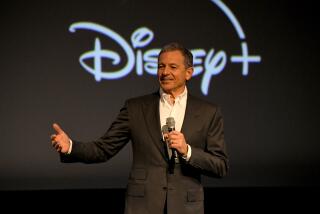CBS chief Leslie Moonves’ pay was $66.9 million in 2013
- Share via
CBS has “The Big Bang Theory” and its boss has an astronomical paycheck.
Leslie Moonves, the network’s chief executive, was awarded a $66.9-million compensation package last year, according to a Securities and Exchange Commission filing Friday. That was up nearly 8% from the $62.2-million package he got in 2012, a year that also kept Moonves in a rarefied group of the nation’s most handsomely compensated corporate executives.
Moonves was paid $3.5 million in salary and received a $28.5-million bonus. He also got stock awards valued at $26.5 million, plus $5.8 million in stock options. Then there are the perks that include personal use of a corporate aircraft, a security detail and a driver.
The network defended the rich pay package, pointing out that the company had a blockbuster year in 2013.
FACES TO WATCH 2014: Digital media
CBS was the most-watched network last year, with hits such as “The Big Bang Theory,” “NCIS” and “Elementary” that helped push profit up 19% to nearly $2 billion. And the price of the company’s shares soared 69% in 2013.
“The share appreciation was not only the highest among major media companies, it was near the top of the entire S&P 500,” CBS said in a statement. “This is the fifth consecutive year that the company’s performance significantly exceeded the S&P 500, including a period during which CBS stock appreciated by more than 20 times.”
CBS shares fell $1.30, or 2.2%, to $58.68 on Friday, though they traded at an all-time high of $60.23 just last month.
Moonves is by far the highest-paid CEO in the media industry.
Walt Disney Co. Chief Executive Robert Iger’s pay fell to $34.3 million for the 2013 fiscal year. Discovery Communications CEO David Zaslav’s compensation package was valued at $33.3 million. Cable giant Comcast Corp., which runs NBCUniversal, reported Friday that CEO Brian L. Roberts received a $31-million pay package.
Moonves’ boss, 90-year-old Sumner Redstone, collected $57 million in compensation for the year. The CBS chairman also received $36 million as executive chairman of Viacom Inc., so his total payout from the two media giants was $93 million.
Moonves earns more than most Wall Street CEOs. His nearly $70-million payday is triple the $23 million that Goldman Sachs Group Inc. CEO Lloyd Blankfein made. It also blasts past the $20 million in compensation that JPMorgan Chase & Co. chief Jamie Dimon received.
ON LOCATION: Where the cameras roll
$67 million “is a really big number for a year’s worth of work,” said Charles Elson, a corporate governance expert at the University of Delaware. “Any time a number becomes a multiple of other highly paid CEOs, it’s a big figure.”
The highest paid CEO in the U.S is Oracle Corp.’s Larry Ellison. He received a package of $78.4 million in fiscal 2013, and that’s down 18% from the previous year.
Moonves’ big payout came at a crucial time for CBS.
The network prevailed during last summer’s high-profile monthlong dispute with Time Warner Cable Inc. over fees paid to carry the broadcast signal of local CBS stations. The company owns KCBS-TV Channel 2 and KCAL-TV Channel 9 in Los Angeles.
And this week saw Moonves orchestrate a smooth transition at CBS late night by naming the well-regarded Comedy Central comedian Stephen Colbert to replace David Letterman as host of “Late Show.” Letterman announced last week that he would retire in 2015.
Still, Moonves manages a company that is substantially smaller than its peers, such as Disney and Comcast.
The money Moonves makes could come in handy. The Beverly Hills resident recently bought a Malibu beach house from Microsoft Corp. founder Paul Allen. The New York Post reported that Moonves paid $28 million for Allen’s home along Carbon Beach, an enclave known for its concentration of billionaires, several of whom have ties to the entertainment industry.
More to Read
From the Oscars to the Emmys.
Get the Envelope newsletter for exclusive awards season coverage, behind-the-scenes stories from the Envelope podcast and columnist Glenn Whipp’s must-read analysis.
You may occasionally receive promotional content from the Los Angeles Times.












